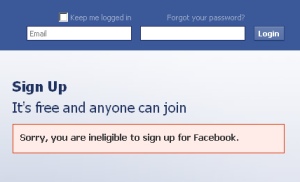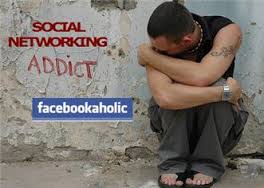 It’s a modern day rite of passage: Turning 13 and being legally able to sign up for your very own Facebook account. I emphasise legally as there is also that one or two eager twelvie wanting to be connected earlier than the rest of their peers. The number of youths signing up before their time has reached 7.5 million world wide and while that may seem like an astronomical number, on a singular level, most would say that it is not the big of a deal. However The NewYork Times has highlighted one core reason those breaking the age restriction may find trouble further along in the Facebook lifetime:
It’s a modern day rite of passage: Turning 13 and being legally able to sign up for your very own Facebook account. I emphasise legally as there is also that one or two eager twelvie wanting to be connected earlier than the rest of their peers. The number of youths signing up before their time has reached 7.5 million world wide and while that may seem like an astronomical number, on a singular level, most would say that it is not the big of a deal. However The NewYork Times has highlighted one core reason those breaking the age restriction may find trouble further along in the Facebook lifetime:
“A child could be found, for instance, if she was 10 years old and said she was 13 to sign up for Facebook. Five years later, that same child would show up as 18 years old – an adult, in the eyes of Facebook — when in fact she was only 15. At that point, a stranger could also see a list of her friends.”
Stranger-Danger, as a society this is still one of the major anxieties we have for our children, only now it has escaped into our online worlds. The issue of child predators and online sleuthing has come hand in hand with Facebook and other social medias success in the same way that other new technologies has brought social anxieties in the past. So much so that there are now computer protection programs that allow parents to install software that both protects and restricts children’s online capabilities. Facebook has recognised the issue within their regulatory proceedings and have moved to make changes. According to a Wall Street Journal the first change is that Facebook may allow users to be under the 13 years old age bracket with new mechanisms being in put in place to link the child’s account to their parents. The second is a new scanning system which Facebook uses to watch for potential predators or terrorism threats.
But let’s talk about Facebook in more broad terms. Established in 2004 by Mark Zuckerberg and having only just reached it 10th birthday, the social media sites has over 1 billion users and a with the company worth of $US150 billion, it is safe to say this is a major player on the technological sphere. USA Today sums up the good and bad of Facebook in one word: Intimacy. It is both the core strength of the media platform as well as it major weakness, allowing communities to come together but also facilitating communication between perfect strangers.
There are new anxieties from an outsiders perspective with images of an anti-social, aggressive, lonely future for ‘the children’. There are also internal anxieties from actual Facebook users with a study being conducted that took technology away from 200 students for 24 hours.
“I clearly am addicted and the dependency is sickening,” said one student.
The study found that this thought resonated with the majority of the students as well as characteristics that were identified as traits held by alcoholics such as withdrawal, cravings, anxiety and a sense of detachment. The students themselves acknowledged that the need for technology and Facebook was also however a way in which they could feel connected, accessible and in control. That highlights one of the biggest anxieties users feel when they can’t access the social site, being disconected, uninformed and therefore not able to participate in what they consider society, they’re biggest concern is being cut off from the constant and instant flow of information.
The following video is just one of many different media examples on how the users and audience of Facebook are able to discuss the effect of the platform. It is a casual view of the world Facebook has created which presents the idea that media in itself should not be or rather is not taken to seriously by its users.
Another perspective from Hub Pages attempts to present both positive and negative impacts Facebook has on children, however when the article paints Facebook as an addictive, society damaging, delinquent creating media it is hard to view it as a useful tool for children.
“As if parents did not already have enough to worry about, now they need to worry about their children displaying negative psychological effects from over-using Facebook”
Debate.org is a way in which members of society can voice their opinion about Facebook in a debate like format. This in itself demonstrates how society is using the very thing it has concerns about in order to discuss those concerns. Ironic? This movement to an online sphere along with the anxieties that are presented are all relative to space. We are now a digital nation, with a constant flow of information, being greater connected but with broader concerns for societies well being. Facebook is merely a media platform by which social change is facilitated, therefore concerns and the ability to shape the future go hand-in-hand.
References:
Huffington Post 2014, Facebook Age Requirement, Accessed 28th of September 2014, http://www.huffingtonpost.com/2012/11/30/facebook-age-requirement-lying-study_n_2213125.html USA Today 2014, How Facebook changed our lives, Accessed 27th of September 2014, http://www.usatoday.com/story/tech/2014/02/02/facebook-turns-10-cultural-impact/5063979/ Psych Central 2014, New College Addiction? Social Media, Facebook or Friends, Accessed 28th of September 2014, http://psychcentral.com/news/2010/04/23/new-college-addiction-social-media-facebook-or-friends/13108.html

